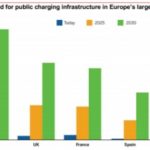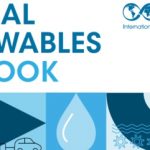On January 1st France launched its flagship EV “social leasing” programme, at a typical price of €100/month, targeting 25,000 users. Within six weeks it was oversubscribed, forcing the government to close the scheme and alter the subsidy regime to accommodate the new total of 50,000. The programme’s popularity demonstrates its relevance and justifies its future expansion. However, the system needs to change if it is to meet the challenges … [Read more...]
Roadmap to reduce EU car fleet emissions 86% by 2040
T&E has just published its car decarbonisation roadmap. It shows that the EU’s car CO2 standards, including the phase-out of combustion car sales in 2035, is the single most important emission reduction measure. But if the EU is to hit its newly proposed 2040 climate target - a 90% CO₂ reduction across the European economy by 2040 - it will need to deal with a significant amount of ICE (internal combustion engine) cars already on the road. … [Read more...]
EU: no CO2-emitting car sales from 2035. But beware of the small exemption for e-fuels
At the end of March, EU countries gave final approval to end sales of new CO2-emitting cars in 2035. It came after Germany argued for and won an exemption for cars running on e-fuels. William Todts at T&E celebrates the landmark decision, but warns that this lifeline for e-fuels will be used by its supporters and the oil lobby to obstruct the rapid transition to EVs. He quotes T&E research that shows e-fuels are far less efficient than … [Read more...]
Russia–Ukraine war: household energy costs worldwide have nearly doubled, with the poorest hit hardest
A new study measures the effect of the Russia-Ukraine war on household energy costs worldwide. It’s nearly doubled, explain Klaus Hubacek, Jin Yan and Yuru Guan at the University of Groningen and Yuli Shan at the University of Birmingham. Their study sums the costs of direct energy like heating, cooling, lighting and mobility, as well as the indirect costs through the energy used to produce goods and services. That doubling translates into an … [Read more...]
Do e-bike subsidies lift sales, change habits and cut emissions?
What happened when Sweden introduced a 25% rebate on the cost of an e-bike for 12 months over 2017-18? Lucas Davis at the Haas School of Business reviews a study that digs into the consequences. Sales increased by 70%. E-bike prices remained steady, so the sellers didn’t simply raise prices to eat up the rebate. The study estimates that although a third of those sales would have “happened anyway” (i.e. no additionality) the remaining two-thirds … [Read more...]
New research ranks the 12 best ways to cut car use in cities
Behaviour change is as an important part of our transition journey as the clean energy revolution. Kimberly Nicholas at Lund University summarises research that has gathered together nearly 800 peer-reviewed reports and case studies from across Europe that analyse ways of reducing car use. One main challenge is to quantify the benefits so policy-makers and citizens can make evidence-based decisions on how to re-imagine city mobility. Nicholas … [Read more...]
The expansion of Europe’s EV charging infrastructure: new rules and incentives needed
In 2021 the Alternative Fuels Infrastructure Directive, which regulates public charging infrastructure, will be revised and updated by the European Commission. Referencing her study, Julia Hildermeier at RAP identifies some of the rules and incentives that will be needed to optimise the expansion of EV charging infrastructure. To start with, she says that EU countries need to define the baseline essential charging network. Such a promise would … [Read more...]
City-level emissions reductions: what can successful cities teach us
The EU Covenant of Mayors for Climate and Energy (EUCoM) requires their member cities to commit to exceeding their national goals. EUCoM is one of the world’s largest subnational climate action networks, with over 1,000 cities and home to 50m people. Writing for Carbon Brief, Angel Hsu, Nihit Goyal and Amy Weinfurter at Yale-NUS College review the data to see how successful they have been. About 40% of the cities show emission reductions that are … [Read more...]
IRENA’s Global Renewables Outlook and how Europe can lead the way
If the coronavirus slump has knocked everything off track IRENA’s first ever Global Renewables Outlook is a timely reminder of what that track should look like. It can help policymakers design stimuli packages that will get us back onto it, and even accelerate the transition. IRENA’s Gayathri Prakash, Nicholas Wagner and Ricardo Gorini run through the comprehensive report’s main recommendations. Annual investment, shares and GW targets to 2030 … [Read more...]
Decarbonising light duty vehicles globally: consumer choice, technology, policy pathways
The MIT Energy Initiative (MITIE) has completed a 3-year study of “Mobility of the Future” to plot a decarbonised pathway for light duty vehicles (i.e. cars) globally. Wide in scope and detail, it covers government policies, consumer choices and technologies, combining their multiple and complex impacts to make their assessments. Kathryn Luu at MITIE reviews the final 220-page report. For consumers, cost, convenience, and — increasingly — carbon … [Read more...]
Behaviour Change: measuring complex mobility options to make cities smarter
How do you factor future behaviour change into transport, housing, workplace and energy infrastructure planning? Clearly, future plans based on past behaviour will end up being wrong. And metrics that tell us which behaviour is most efficient can point us in better directions. We won’t find the answer until we start measuring it. That’s why the National Renewable Energy Laboratory (NREL) is leading a collaboration of U.S. government and academia … [Read more...]












